最新外研版英语八年级下册知识点总结
(完整版)外研版八年级下册+英语M2+Experience课文知识点
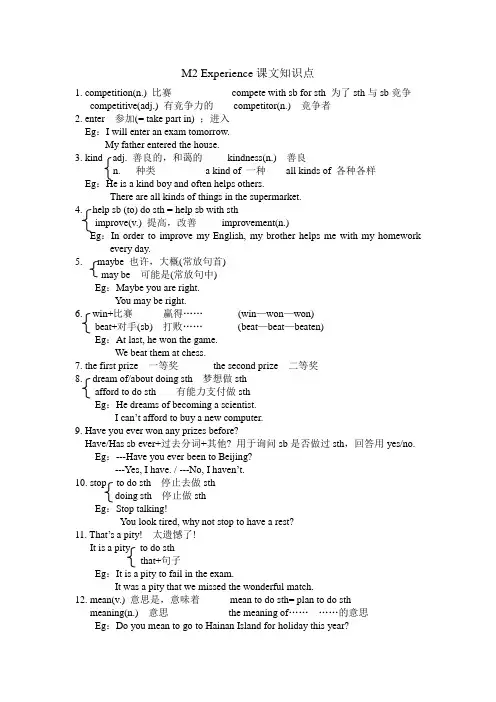
M2 Experience课文知识点1. competition(n.) 比赛compete with sb for sth 为了sth与sb竞争competitive(adj.) 有竞争力的competitor(n.) 竞争者2. enter 参加(= take part in) ;进入Eg:I will enter an exam tomorrow.My father entered the house.3. kind adj. 善良的,和蔼的kindness(n.) 善良n. 种类 a kind of 一种all kinds of 各种各样Eg:He is a kind boy and often helps others.There are all kinds of things in the supermarket.4. help sb (to) do sth = help sb with sthimprove(v.) 提高,改善improvement(n.)Eg:In order to improve my English, my brother helps me with my homework every day.5. maybe 也许,大概(常放句首)may be 可能是(常放句中)Eg:Maybe you are right.You may be right.6. win+比赛赢得……(win—won—won)beat+对手(sb) 打败……(beat—beat—beaten)Eg:At last, he won the game.We beat them at chess.7. the first prize 一等奖the second prize 二等奖8. dream of/about doing sth 梦想做sthafford to do sth 有能力支付做sthEg:He dreams of becoming a scientist.I can’t afford to buy a new computer.9. Have you ever won any prizes before?Have/Has sb ever+过去分词+其他? 用于询问sb是否做过sth,回答用yes/no.Eg:---Have you ever been to Beijing?---Yes, I have. / ---No, I haven’t.10. stop to do sth 停止去做sthdoing sth 停止做sthEg:Stop talking!You look tired, why not stop to have a rest?11. That’s a pity! 太遗憾了!It is a pity to do sththat+句子Eg:It is a pity to fail in the exam.It was a pity that we missed the wonderful match.12. mean(v.) 意思是,意味着mean to do sth= plan to do sthmeaning(n.) 意思the meaning of…………的意思Eg:Do you mean to go to Hainan Island for holiday this year?13. 动词不定式to do 结构在句中可以作目的状语之外,还可以作宾语、宾语补足语。
Module 1课文知识点总结(含语法)-外研版八年级下册英语
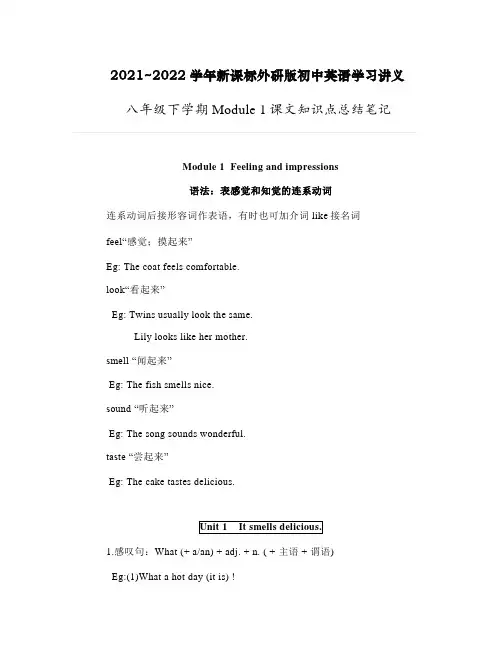
2021~2022学年新课标外研版初中英语学习讲义八年级下学期Module 1课文知识点总结笔记Module 1 Feeling and impressions语法:表感觉和知觉的连系动词连系动词后接形容词作表语,有时也可加介词like接名词feel“感觉;摸起来”Eg: The coat feels comfortable.look“看起来”Eg: Twins usually look the same.Lily looks like her mother.smell “闻起来”Eg: The fish smells nice.sound “听起来”Eg: The song sounds wonderful.taste “尝起来”Eg: The cake tastes delicious.1.感叹句:What (+ a/an) + adj. + n. ( + 主语 + 谓语)Eg:(1)What a hot day (it is) !(2) What nice pictures (they are) !How +adj./ adv. (+ 主语+谓语)!Eg: (1) How delicious the cakes are ! (2) How fast he runs !2.smell (n.) “气味”Eg: There is a strange smell in the air.(连系动词)“闻起来”其后跟adj. 作表语Eg: The fish smells bad.3.look (连系动词) “看起来”后跟adj.作表语。
Eg: They look so happy.(v.) “看” look at “看…”Eg: (1) Look! The ducks are swimming.(2) Look at the picture.(n.) “看” have a look at …“看一看”Eg: Let’s have a look at the watches.4.would like sth. 想要某物Eg: I’d like a bottle of water.would like to do sth. 想要做某事Eg: We’d like to go to the zoo.would like sb. to do sth.# 想要某人做某事Eg: I’d like you to help me.would like 相当于want,但would为情态动词,故无人称和数的变化,变一般疑问句时,把would提前,would you like… ? 表示提建议,句中用some而不用any.Eg: Would you like some bread ?–Yes, please./No, thanks.5.want (v.) “想;想要”want sth. “想要某物”want to do sth. “想要做某事”6.try (v.) “尝试;试图”try to do sth. 尽力做某事Eg: I try to work hard to get good marks.try doing sth. 试着做某事Eg: I try cooking well.try a piece 尝一块try (n.) 尝试 have a try 试一试7.taste (连系动词) “尝起来”后接adj. 或介词短语作表语Eg: (1) The cakes taste delicious.蛋糕尝起来很美味。
2024年春八年级英语下册Module8Timeoff模块整体分析新版外研版
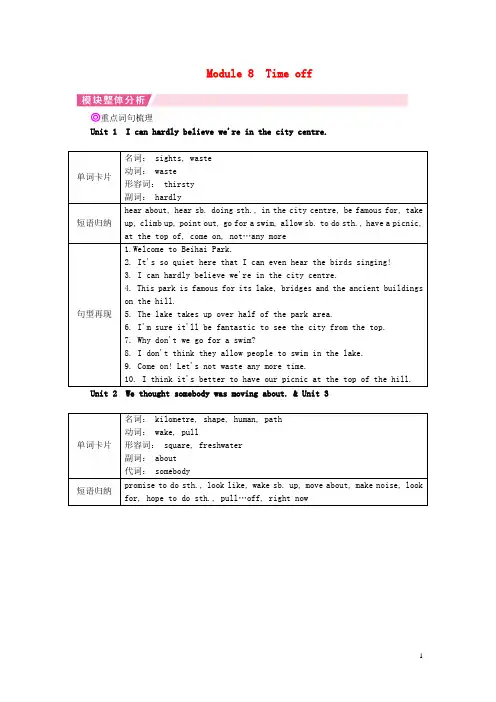
Module 8 Time off Unit 1I can hardly believe we're in the city centre.单词卡片名词: sights, waste 动词: waste形容词: thirsty副词: hardly短语归纳hear about, hear sb. doing sth., in the city centre, be famous for, take up, climb up, point out, go for a swim, allow sb. to do sth., have a picnic, at the top of, come on, not…any more句型再现1.Welcome to Beihai Park.2. It's so quiet here that I can even hear the birds singing!3. I can hardly believe we're in the city centre.4. This park is famous for its lake, bridges and the ancient buildings on the hill.5. The lake takes up over half of the park area.6. I'm sure it'll be fantastic to see the city from the top.7. Why don't we go for a swim?8. I don't think they allow people to swim in the lake.9. Come on! Let's not waste any more time.10. I think it's better to have our picnic at the top of the hill.Unit 2We thought somebody was moving about. & Unit 3单词卡片名词: kilometre, shape, human, path 动词: wake, pull形容词: square, freshwater副词: about代词: somebody短语归纳promise to do sth., look like, wake sb. up, move about, make noise, look for, hope to do sth., pull…off, right now(续表)句型再现1. I promised to write, so…st night we camped by a small lake.3. We thought somebody was moving about.4. We came out without making any noise, and found it was justa hungry monkey looking for food.5. Tomorrow we're going to Dongting Lake, the secondlargest freshwater lake in China.6. Wish you were here!7. I pulled a leaf off a plant, but Lingling's uncle said that it was wrong to pull leaves off plants and that we should protect everything here.教材内容解读本模块以“旅游和休假”为话题,绽开听、说、读、写一系列语言实践活动。
外研版八年级英语下册重要知识点归纳
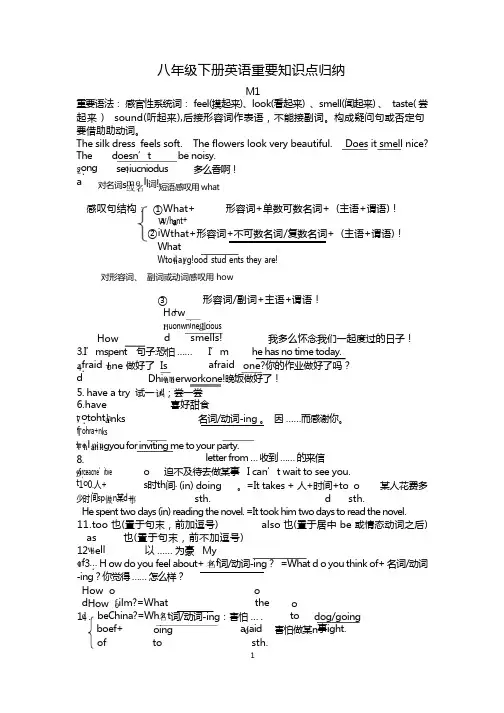
八年级下册英语重要知识点归纳M1 重要语法: 感官性系统词: feel(摸起来)、look(看起来) 、smell(闻起来) 、 taste( 尝起来 ) sound(听起来),后接形容词作表语,不能接副词。
构成疑问句或否定句 要借助助动词。
The silk dress feels soft. The flowers look very beautiful. Does it smell nice? The doesn’t be noisy. o .ng se iucniodus 多么香啊! a 对名词s l l 词!短语感叹用 what感叹句结构: ①What+ 形容词+单数可数名词+ (主语+谓语)! /h nt + ②i Wthat+形容词+不可数名词/复数名词+ (主语+谓语)!WhatWto a g!ood stud ents they are!对形容词、 副词或动词感叹用 how③ 形容词/副词+主语+谓语!H wuonwn i ne ciousHow d smells! 我多么怀念我们一起度过的日子!3.I’mspent 句子:恐怕 …… I’m he has no time today. f .raid ne 做好了 Is afraid one?你的作业做好了吗? d Dhi e rworkone!晚饭做好了!5. have a try 试一;尝一尝6.have 喜好甜食 o .toht nks 名词/动词-ing 。
因 ……而感谢你。
ohra+n ksl gy ou for inviting me to your party. letter from … 收到 …… 的来信 r .ceacne’itv e t 1o 0.人+ sth. d sth. He spent two days (in) reading the novel. =It took him two days to read the novel.11.too 也(置于句末,前加逗号) also 也(置于居中 be 或情态动词之后) as 也(置于句末,前不加逗号)12e ll 以 …… 为豪 My f 3…. H ow do you feel about+ f 词/动词-ing ? =What d o you think of+ 名词/动词 -ing ?你觉得 …… 怎么样? How o o d How ilm?=What the o1 . beChina?=W h t 词/动词-ing :害怕 … . to dog/goingboef + oing a aid 害怕做某n 事ig ht.of to sth.o 迫不及待去做某事 I can’t wait to see you. s 时th 间. (in) doing 。
新外研版八年级英语(下册)重点知识点总结
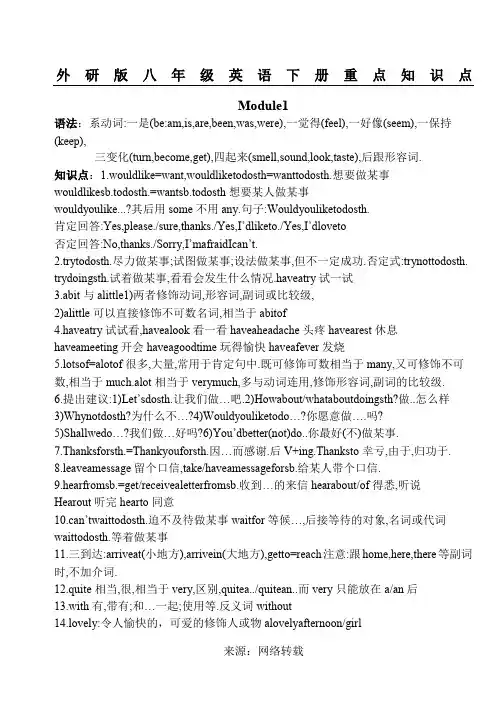
外研版八年级英语下册重点知识点Module1语法:系动词:一是(be:am,is,are,been,was,were),一觉得(feel),一好像(seem),一保持(keep),三变化(turn,become,get),四起来(smell,sound,look,taste),后跟形容词..11.三到达:arriveat(小地方),arrivein(大地方),getto=reach注意:跟home,here,there等副词时,不加介词.12.quite相当,很,相当于very,区别,quitea../quitean..而very只能放在a/an后13.with有,带有;和…一起;使用等.反义词without14.lovely:令人愉快的,可爱的修饰人或物alovelyafternoon/girllively:活泼的,生动的alivelylesson:一堂生动的课16.四个花费:take:Ittakessb.sometimetodosth./Ittooksb.sometimetodosth.Spend:Sb.spendsometime/moneyonsthSb.spendsometime/money(in)doingsth.Pay:Sb.paysomemoneyforsth.cost:sthcostsb.somemoney.,暗示.注意:词数70左右。
Ihaveanetfriend.SheisfromSydney,Australia.Thegirlisfifteenyearsold.Sheisthinwithtwo bigeyes.Shehaslongfairhair.Sheisfriendlyandoutgoing.Shealwayshasabigsmileonherface.S helikesreadingandchattingontheInternetwithherfriends.Shesaidthatreadingmadehergrowup asaperson.IfeelveryhappywhenIchatwithher.Ilikemynetfriendverymuch.IhopeIcangotoSyd neytoseeheroneday.Module2语法:现在完成时:表过去发生或已经完成的某一动作,对现在造成的影响和结果,或持续到现在的动作。
外研版英语八年级下册知识点Module-1—5
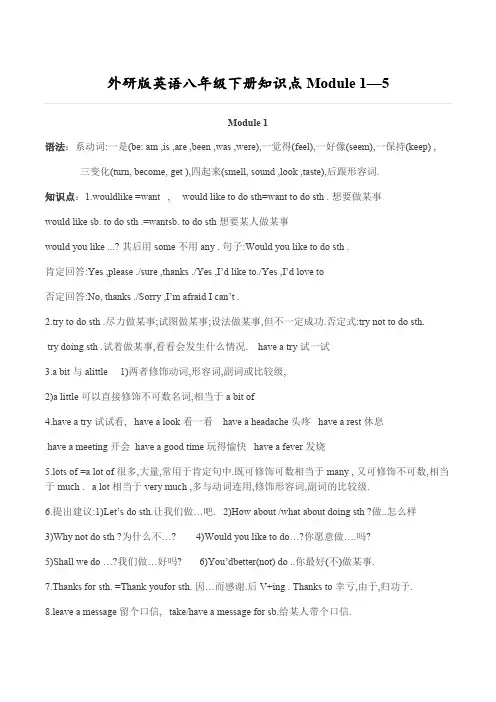
Module 1语法:系动词:一是(be: am ,is ,are ,been ,was ,were),一觉得(feel),一好像(seem),一保持(keep) ,三变化(turn, become, get ),四起来(smell, sound ,look ,taste),后跟形容词.知识点:1.wouldlike =want , would like to do sth=want to do sth . 想要做某事would like sb. to do sth .=wantsb. to do sth 想要某人做某事would you like ...? 其后用some 不用any . 句子:Would you like to do sth .肯定回答:Yes ,please ./sure ,thanks ./Yes ,I’d like to./Yes ,I’d love to否定回答:No, thanks ./Sorry ,I’m afraid I can’t .2.try to do sth .尽力做某事;试图做某事;设法做某事,但不一定成功.否定式:try not to do sth.try doing sth .试着做某事,看看会发生什么情况. have a try 试一试3.a bit 与alittle 1)两者修饰动词,形容词,副词或比较级,2)a little 可以直接修饰不可数名词,相当于a bit of4.have a try 试试看, have a look 看一看have a headache头疼have a rest 休息have a meeting 开会 have a good time 玩得愉快 have a fever发烧5.lots of =a lot of 很多,大量,常用于肯定句中.既可修饰可数相当于many , 又可修饰不可数,相当于much . a lot 相当于very much ,多与动词连用,修饰形容词,副词的比较级.6.提出建议:1)Let’s do sth.让我们做…吧. 2)How about /what about doing sth ?做..怎么样3)Why not do sth ?为什么不…?4)Would you like to do…?你愿意做….吗?5)Shall we do …?我们做…好吗? 6)You’dbetter(not) do ..你最好(不)做某事.7.Thanks for sth. =Thank youfor sth. 因…而感谢.后V+ing . Thanks to 幸亏,由于,归功于.8.leave a message留个口信, take/have a message for sb.给某人带个口信.9.hear from sb.=get /receive aletter from sb . 收到…的来信 hear about /of 得悉,听说Hear out 听完hear to 同意10.can’t wait to do sth .迫不及待做某事wait for 等候…,后接等待的对象,名词或代词wait to do sth .等着做某事11.三到达 :arrive at (小地方),arrive in (大地方),get to =reach 注意:跟home,here ,there 等副词时,不加介词.12.quite相当,很,相当于very,区别, quite a ../ quite an ..而very只能放在a /an 后13.with 有,带有;和…一起;使用等.反义词without14. lovely: 令人愉快的,可爱的修饰人或物 a lovely afternoon / girllively: 活泼的,生动的 a lively lesson:一堂生动的课16.四个花费: take: It takes sb. some timeto do sth. /It took sb .some time to do sth .Spend : Sb. spend some time/ money on sthSb. spend some time/ money (in) doing sth.Pay: Sb. pay some money forsth.cost : sth cost sb .some money .17.四个也:as well 肯定,句末,不用逗号 too,肯定,句末,逗号可有可无.either:否定句末, also ,肯定句中,行前be 后.18.proud .adj. be proud of 为…而感到骄傲 be proud to do sth .做某事很自豪.pride. n. take pride in ….为…感到自豪; the pride of ….的骄傲.19.How do you feel about …?对…感觉如何?与How do you like …?20.at first 起初,开始,常位于句首或句末,反义词.at last 最后,终于first of all ,首先,用作插入语,说明顺序,后接next ,then , at first ,指刚开始做某事的时候,暗示后来的情况有所改变.21.few /a few修饰可数名词,little /a little 修饰不可数名词,有a 表示有,没有a 表示没有.22.way 的短语:in this way 用这种方式, in the right way用正确的方法, the way of 做..的方式on the way to …在去…的路上bythe way 顺便说一下.23.be afraid of 害怕,后接名词,代词或动名词be afraid todo sth .害怕做某事24.each other 互相25.be nervous about 对…感到紧张26.问外貌:What+do/does /did +主语+look like ? 问性格:What +be +主语+like ?27.be friendly to sb. 对某人友好- 28.be good at =do well in 擅长,后跟doingsth .或名词。
外研版丨八年级下册英语各单元重点语法
外研版丨八年级下册英语各单元重点语法肯定句、否定句、疑问句和特殊疑问句肯定句:主语+have/has+动词的过去分词+其他成分。
例如:I have XXX.我已经完成了我的作业。
否定句:主语+have/has+not+动词的过去分词+其他成分。
例如:He has not seen the movie yet.他还没有看过这部电影。
疑问句:Have/Has+主语+动词的过去分词+其他成分?例如:Have you ever been to Japan?你去过日本吗?特殊疑问句:特殊疑问词+have/has+主语+动词的过去分词+其他成分?例如:What have you done today?你今天做了什么?In Module 3.we will learn about the present perfect tense。
This tense is used to express XXX and have an impact on the present。
We can use words like just。
already。
and yet to emphasize or explain the n。
For example。
"I have just heard the news," "Astronauts have already been to the moon," and "He has just XXX." Just means "recently," already means "before now,"and both are used in affirmative sentences after have/has。
Yet is used in negative sentences to mean "not yet" and implies that the n may happen in the future.Scientists have not yet received any XXX life。
外研版八年级英语下册重要知识点归纳
八年级下册英语重要知识点归纳M1重要语法:感官性系统词:feel(摸起来)、look(看起来)、smell(闻起来)、taste(尝起来)sound(听起来),后接形容词作表语,不能接副词。
构成疑问句或否定句要借助助动词。
The silk dress feels soft.The flowers look very beautiful.Does it smell nice?be noisy.The song doesn’t sound2. What a d elicious smell!多么香啊!对名词或名词短语感叹用what感叹句结构:①What+ a/an+形容词+单数可数名词+(主语+谓语)!What an interesting book it is!②What+形容词+不可数名词/复数名词+(主语+谓语)!What bad weather it is today!What good students they are!对形容词、副词或动词感叹用how③ How +形容词/副词+主语+谓语!How fast he is running!How delicious it smells!How I miss the days we spent together!我多么怀念我们一起度过的日子!句子:恐怕……I’m afraid he has no time today.3.I’m afraid+4. be d one做好了Is your homework d one?你的作业做好了吗?Dinner is done!晚饭做好了!5. have a try试一试;尝一尝6.have a sweet tooth喜好甜食7.thanks for=thank you for+名词/动词-ing。
因……而感谢你。
Thanks for your help.=Thanks for helping me .Thank you for inviting me to your party.…的来信8. hear from…=get /receive aletter from收到……o sth.迫不及待去做某事I can’t wait to see you.9.can’t wait to d10.人+ spend+时间(in)d oing sth.。
外研版八年级下册英语重要知识点及固定搭配填空(含答案)
外研版八年级下册英语重要知识点及固定搭配填空(适用于八年级下册期末复习/九年级上册复习)1.enjoy_____________sth.做某事很高兴2.enjoy____________(代词)玩得高兴3.be afraid____________sth.害怕做某事4.be afraid___________(介词)doing sth.害怕做某事5.help sb.__________或________sth.帮助某人做某事6.help sb._____________(介词)sth.帮助某人在某方面7.what/how about____________sth?做……(事)怎么样8.thank sb.__________(介词)doing sth.因为某事而感谢某人9.be proud___________(介词)sth.因…而骄傲10.take pride____________(介词)sth.因…而骄傲11.be friendly____________(介词)sb.对某人友好12.be angry_____________(介词)sb.对某人生气13.be different_____________(介词)与……不同14.be the same____________(介词)与……相同(一样)15.let/make/have sb.___________sth.(使)让某人做某事,let/make/have被称为_________动词16.why not____________sth为什么不做……呢17.had better___________sth.最好做某事18.help sb.________/_________sth.帮助某人做某事19.see sb.____________sth.看到某人做某事(经常、全过程)20.can’t wait_____________sth.迫不及待去做某事21.can’t help_____________sth.忍不住做某事22.____________school在学校;上学23.be nervous_______/______(介词)sth.对……紧张的24.dream___________(介词)doing sth.梦想做某事25.It is wonderful(for sb.)____________sth.做某事对某人来说很棒26.two_____________bridges两座塔桥27.two____________________两个男教师28.find_________(形宾)hard____________sth.认为做某事很艰难。
外研版初中八年级英语下册所有重点知识考点全总结
外研版初中八年级英语下册所有重点知识考点全总结Module1 Feelings and impressions【重点短语】1. look sb. in the eye 正视某人2. look+形容词看上去…3. be afraid that +从句恐怕…be afraid to do sth 害怕做某事be afraid of doing sth 害怕……4. thank (sb ) for doing sth 因某人做某事而感谢thank(sb)for sth 因…感谢某人5. can’t wait to do sth 迫不及待做某事6. spend 时间/金钱+(in)doing sth. 某人花时间/金钱做…spend 时间/金钱+on sth. 某人在某方面花时间/金钱7. be proud of…以…为自豪8. be proud to do sth. 为做某事而感到自豪9. be proud that…为……感到自豪10. hear from/ receive a letter from... 收到......的来信11. each other 互相,彼此12. arrive in/at 到达13. be good at 擅长,善于14. have a try 尝试15. on top 在上面,处于优势16. in the middle 在中间17. as well 也;还18. in the right way 以正确的方式19. be excited about 对...兴奋20. shake hands 握手21. close to 离......近【重点句型】1. 它闻起来不新鲜。
It doesn’t smell fresh.2. 每种东西都(尝起来)甜滋滋的。
Everything tastes so sweet.3. 多好闻的味道啊!What a delicious smell.4. ——你想来点尝尝吗?——好的,谢谢。
- 1、下载文档前请自行甄别文档内容的完整性,平台不提供额外的编辑、内容补充、找答案等附加服务。
- 2、"仅部分预览"的文档,不可在线预览部分如存在完整性等问题,可反馈申请退款(可完整预览的文档不适用该条件!)。
- 3、如文档侵犯您的权益,请联系客服反馈,我们会尽快为您处理(人工客服工作时间:9:00-18:30)。
最新外研版英语八年级下册知识点总结Module1FeelingsandimpressionsUnit1?Smell:一股气味(可数名词)_____goodadvice!It’ssohelpfultous.(what/How)_____interestingthestoryis!(What/How):adj.美味的,友好的,令人愉快的niceweather:好天气benicetosb.:对某人友好anicetrip:一次令人愉快的旅行Thecookietastesnice.这块饼干尝起来美味。
比want语气更委婉。
----Wouldyouliketostayherewithus?----Yes,I’dlike/loveto.:令人愉快的,可爱的修饰人或物alovelyafternoon/girllively:活泼的,生动的alivelylesson:一堂生动的课’mafraidthat+从句:恐怕(表示歉意或让对方失望的情况)I’mafraidthatIcan’tcometoyourpartytomorrow.abit=alittle:有点儿,有点后接/形容词/副词\形容词/副词的比较级Ifeelabitthirstynow.Aftertherain,peoplefeelabit/alittlecooler.2)alittle+不可数名词:Thereisalittletimeleft.abitof+不可数名词:ThereIsabitofwaterinthebottle.:试一试havea/an+名词haveaswim:游泳haveabreak:休息haveashower:洗沐浴.我喜欢吃甜食。
:做好了,完成了done:adj.做好了的,完成了+从句:Areyousurewhatyousaid?Besureof/aboutsth.:对……确信I’msureof/aboutthetelephonenumber. besure(not).:确保/务必(不)做某事Besurenottomisstheearlybus.:幸运日You’realuckyboy.你是一个幸运儿。
Goodlucktoyou.祝你好运。
Unit2=thankyoufor:因……而感谢你Thankyoufor/yourhelp.\sendingmephots.:口信、信息(可数名词)takeamessage:捎个口信leaveamessage:留信Information:信息(不可数名词)apieceofinformation,someinformation.=get/receivealetterfromsb.:收到某人的来信Iheardfrommyunclelastweek.=Igot/receivedaletterfrommyunclelastweek.’twaittodosth.:等不及/迫不及待做某事Ican’twaittoopenthepresent.:1)quitea/an+形容词+名词quiteaniceboy:一个相当好的男孩。
2)quite修饰动词时放在动词前Hequitelikesmaths.他很喜欢数学。
very:1)avery+形容词+名词averyniceboy2)very与much合在一起修饰动词时,位于句末。
HelikesEnglishverymuch.:听起来(像)Themusicsoundsverybeautiful.money(in)doingsth.:某人花费时间/钱做某事Don’tspendtoomuchtime(in)pla yingcomputergames.2)moneyonsth.:某人花时间/钱在某事/某物上../sth.:以某人/某事为自豪Parentsareproudoftheirchildren.We’reproudofourcountry../doingsth.=dowellinsth./doingsth.擅长某事/做某事I’mgoodatEnglish/swimming.=IdowellinEnglish/swimming.…?=Whatdoyouthinkof…?=Howdoyoulike…?Howdoyoufeelaboutthefilm?=Whatdoyouthinkofthefilm?:在多久之后,常用于将来时,对其提问用howsoon---HowsoonwillyouleaveBeijing?---I’llcomebackinthreedays.:疑问词+不定式,在句中可作主语、宾语、表语1)Idon’tknow whattodo.=Idon’tknow whatIshoulddo.(作宾语)疑问词加不定式作宾语时可以转换成宾语从句。
2)Whentoholdthemeeting hasn’tbeendecided.(作主语)3)Hisdreamishowtobeagoodscientist.(作表语)4)Idon’tknow whattodo.=Idon’tknowhowtodoit.beafraidofsb./sth.:害怕某人/某物I’mafraidofdoctors/dogs.2)beafraidofdoingsth.:害怕做某事I’mafraidofflying/goingoutatnight.3)beafraidtodosth.:害怕做某事I’mafraidtos wimacrosstheriver.4)I’mafraidthat:恐怕I’mafraidthatyoumuststudyhard.语法:表示感觉和知觉的系动词也称感官系动词1.五个表示感觉和知觉的系动词与眼、耳、口、鼻、手相关系。
look,sound,taste,smell,feel+形容词Hefeelstiredafterwork.2.感官系动词后可接介词like,like后常接名词。
Hisideasoundslikefun.3.感官系动词的句型结构与be不同,其否定形式和疑问形式要借助动词do。
Thefoodtastesdelicious.变成否定句→Thefooddoesn’t tastedelicious.变成一般疑问句→Doesthefoodtastedelicious?4.持续系动词,用来表示主语继续或保持一种状况或态度,主要有keep,remain,stay Theweatherwillkeepwarmfor7days.5.变化系动词有become,grow,turn,get,go等。
书面表达在英语学习中,与北京阳光中学的同学朝夕相处,其中Daniel的善良和助人为乐等优秀品质给我们留下了深刻的印象。
请根据下面提示,用英语写一篇短文。
提示::helpful—helpoldwomancrosstheroadkind—workattheHelpingHandsClubcreative—creativeaTVprogramme点拨:人物介绍(年龄、外貌、身份、性格)→典型事例(性格、品质)→人物评价(喜爱、夸赞)MyfriendDaniel参加enteracompetition:参加比赛2)enter=come/gointo进入Pleaseentertheclassroom.:曾经、从来,用于现在完成时的一疑问句、否定句。
1)Have/+donesth.?某人曾经做过某事吗?Haveyoueverenteredaclub?2)ever用于否定句,notever=never从来Shehasn’teverenteredanycompetitions..以前,与现在完成时连用;也可与一般过去时/一般现在时连用,位于句末。
ShehasneverbeentoBeijingbefore.Turnoffthelightbeforeyouleavetheroom.Hecamebackbefore10o’clocklastnight.afford:买得起、付得起,常与can,could,beableto连用。
’taffordit.2)afford后跟动词不定式作宾语,canaffordto/dosth.:有能力支付做某事\buysth.:买得起某物IcanaffordtovisitShanghaithisyear.Heisverypoorandcan’taffordtobuyahouseinthecity.’!真遗憾!It’sapitythat:太可惜了It’sapitythatyoucan’tcometotheparty.,there,out,in等表示方位的副词开头的句子中,主语是名词,句子要全部倒装;如果主语是代词,句子则要部分倒装。
.(主语是名词).(主语是代词)7.不定式短语在句中作目的状语,位于句首或句中。
Tocatchtheearlybus,Igetupearly.(位于句首,其后有逗号) Hestudiedhardtopasstheexam.(位于主句后即句末).=She_______________aboutherfuture.:编造,组成Canyoumakeupastory?bemadeupof:由……组成Thebasketballteamismadeupof20players.Ihopethat(宾语从句)表示祝愿:Ihopethatmydreamwillcometrue.2)hope/wishtodosth.:Iwishtobecomeadoctorinthefuture.3).:Iwishyoutocometomybirthdayparty..:邀请某人做某事Lilyinvitedmetoseeafilmyesterday.2):邀请某人去某地I’llinviteLillytomyparty.Unit21.数词-名词-形容词:合成/复合形容词,其中的名词必须用单数形式,只能放在名词前做定语,不能作表语。
.+the形容词最高级+名词复数形式:最……之一TheYangzeRiverisoneofthelongestriversintheworld..:搬到某地TheyaremovingtoBeijinginamonth.他们一个月后要搬到北京。
.:派遣某人做某事TheysentsomescientiststoworkinBeijing.2):派某人去某地TheschoolsentTomtoGuilin.3).=.:送/寄给某人某物IsentLilyabook.=IsentabooktoLily.+姓氏s:……一家人,……夫妇,其作主语时,谓语动词用复数形式。
TheSmithsarehavingdinnernow.has/havebeento:去过某地(表示经历),人现在已回来,常与ever,never,次数等连用。
